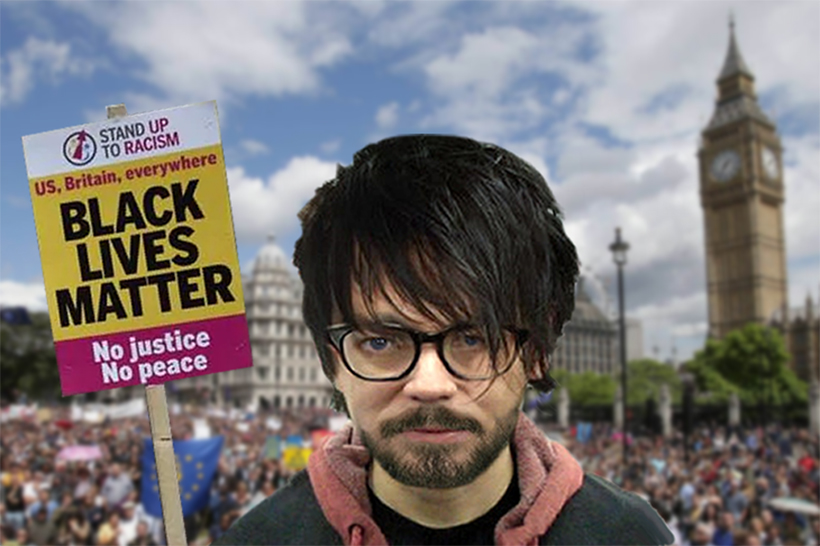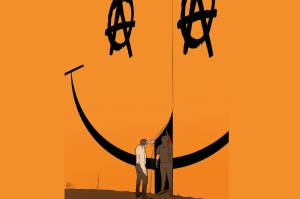This article is in
The Spectator’s November 2019 US edition. Subscribe here.
Portland, Oregon
It was a bright April morning and the sun shone benevolent golden rays upon me as I strode purposefully up the steps to the door of a house in the London district of Islington. Pressing the Victorian brass doorbell, I heard the comforting chimes of Toto’s ‘Africa’ emanating from within and nodded my head in approval. After a few seconds the door was opened by a charming white-passing transracial man who called himself Babatunde (I later found out his birth parents had named him Rupert). He graciously invited me into a spacious studio apartment decorated with tribal carvings from Ikea’s African Solnedgång collection.
‘Please, take a seat,’ said Babatunde, gesturing towards a couch. ‘Would you like a carton of Um Bongo?’ (Note to white-identifying readers: Um Bongo is a fruit beverage marketed in the UK with the slogan ‘Um Bongo, Um Bongo, dey drink it in da Congo’.) I politely declined. I was unsure whether Um Bongo is entirely vegan.
I knew I was different from an early age. While my kindergarten associates sang nursery rhymes, I burned with a sense of injustice at the racist indoctrination (‘Baa, Baa, Black Sheep’), the blatant contempt for the vegan aesthetic (‘This Little Piggy’) and the violent masculine domination the like of which rivaled anything we’ve seen in Hollywood of late (‘Georgie Porgie’). My tiny fists would clench every time my pre-school teacher casually enforced harmful gender stereotypes by allowing the boys to draw cars and the girls princesses, instead of doing the progressive thing and making every child in my class focus on more gender-neutral subjects like homelessness and poverty.
By the time I was 12, I was listening to Bob Marley while memorizing Dr King. I held a protest in my schoolyard for three weeks until the school canteen added fried chicken with rice and peas to the lunch menu. Despite being born white, male and middle class, I identified as a poor black girl who would grow up to become one of the most influential black activists of her generation.
This was at the beginning of 2014. Back then, social justice was much simpler. Brexit hadn’t yet reared its ugly head in the UK, and the idea of a Trump presidency was obviously laughable. Six months earlier, I had bravely come out to the world as Wrongskin (or TransBlack), leading the way for Rachel Dolezal to copy me a year later. Since the summer of 2013, I’d avidly followed the progress of the Black Lives Matter movement in the US. As a black activist myself, I was filled with hope when a member of my ‘Transrace R Us’ Facebook group messaged me in private, told me they were setting up a UK chapter of BLM and asked me to be a VIP member. I of course accepted, provided they reimbursed my travel and accommodation expenses for the duration of my visit.
Dear reader, this was the painful yet phenomenally inspiring lived experience that brought me to Babatunde’s couch. As he left the room to announce my arrival to the rest of the group, I took out my iPhone, opened Twitter and took down a few trolls with some devastating truths before protecting my account and updating my Patreon page. Just as I was about to check my Facebook feed for signs of bigotry, Babatunde returned with an elderly woman and a small boy who looked to be around seven years old.
‘Godfrey, allow me to introduce Shaquana,’ he gestured towards the old woman, who looked confused, then pointed to the child, ‘and Oringo.’ The child giggled and said, ‘I’m Peter!’ I smiled benignly and enquired as to when the rest of the Black Lives Matter UK group would arrive. Babat- — look, I’m just going to call him Rupert from here on — Rupert looked a little perturbed and informed me that the rest of the group had already turned up and that I was looking at them. ‘Shaquana’ (Dorothy) and ‘Oringo’ (Peter) had by this point wandered off towards the TV and were watching an episode of The Fresh Prince of Bel Air from Rupert’s personal DVD collection. When Rupert picked up a set of bongos and attempted to play the theme from Shaft on them, I decided to take my leave.
I felt a little guilty as I left, but it was obvious to me that Rupert was not really transracial, and very possibly had some kind of personality disorder. He appeared to think that being black is simply an attitude, that you can change your race depending on the music you listen to and the media you imbibe. But racial identity isn’t like drinking Um Bongo. I put my headphones on, opened Spotify and walked towards the subway, the comforting sounds of Bob Marley ringing in my ears. Perhaps the UK just wasn’t ready for Black Lives Matter? I pondered to myself. Eighteen months later, I moved to Portland.
This article is in The Spectator’s November 2019 US edition. Subscribe here.



























